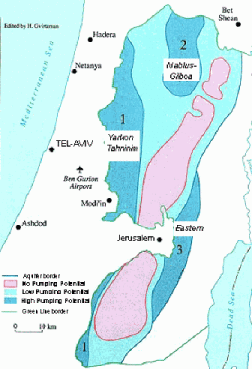The Water Crisis
NOTE: Gaza is 10x worse!!
1 July 2008:
B'Tselem warns of grave water shortage in the West Bank
The chronic water shortage in the West Bank, resulting from an unfair distribution of water resources shared by the Palestinians and Israel, will be much graver this summer because of this year's drought. In the northern West Bank, water consumption has fallen to one-third of the minimal amount needed.
 The 2008 drought, the most serious drought in the area in the past decade, aggravates the built-in, constant shortage of water in the West Bank. Rainfall this year in the northern West Bank was 64 percent of average, while in the southern sections of the West Bank, it was 55 percent. As a result, the water stored from rainfall has already been used. The Palestinian Water Authority estimates this year's water shortage in the West Bank at 42 to 69 million cubic meters. The total water consumption in the West Bank is 79 mcm. The PWA has already requested Mekorot – the Israel Water Company – for an emergency supply of eight mcm.
The 2008 drought, the most serious drought in the area in the past decade, aggravates the built-in, constant shortage of water in the West Bank. Rainfall this year in the northern West Bank was 64 percent of average, while in the southern sections of the West Bank, it was 55 percent. As a result, the water stored from rainfall has already been used. The Palestinian Water Authority estimates this year's water shortage in the West Bank at 42 to 69 million cubic meters. The total water consumption in the West Bank is 79 mcm. The PWA has already requested Mekorot – the Israel Water Company – for an emergency supply of eight mcm.
Severe shortage of water for personal needs
According to the World Health Organization, the per capita minimal amount of water needed for household and urban needs is one hundred liters a day. Due to the chronic water shortage, water consumption in the northern West Bank has dropped to one-third this amount. In Tubas, per capita consumption is 30 liters; in Jenin, it is 38 liters. In Nablus and the Southern Hebron Hills, the figure is slightly higher than fifty liters a day.
Average per capita consumption throughout the West Bank is 66 liters, two-thirds of the minimal amount needed according to the WHO. These figures include water for livestock, meaning that the water consumed for personal use is even less.
In comparison, average daily water consumption in Israeli cities is 235 liters, and 214 liters in local councils, 3.5 times higher than Palestinian consumption in the West Bank.
Villages not connected to a water network
A total of 227,500 Palestinians in 220 towns and villages in the West Bank are not connected to a water network at all, 75 percent of them in the northern West Bank. Another 190,000 Palestinians live in villages that are only partially connected to a water network. Some 20 percent of Palestinians in the West Bank are not connected to a water network.
Even in Palestinian towns and villages that have a water network, water supply is not regular most of the year. Water is supplied only some hours of the day, and sometimes on a rotational basis. In distant areas, water supply may be disconnected for days or weeks. Residents of communities with water networks hooked up to Mekorot report that the company discriminates against them, reducing water supply to Palestinian residents to enable it to meet the increased demand in the settlements.
To aggravate matters, Palestinian farmers hook up unlawfully to the water networks in Palestinian communities in Area C. Israeli authorities, which are charged with enforcing the law in these areas, do not to put an end to the theft.
Water at inflated prices
Lacking regular water supply, many Palestinians have to buy water on the private market. Last year, the price for a cubic meter of water ranged from 15-30 shekels, three to six times higher than Israeli households pay. It is expected that prices will be even higher this year. The high rate of unemployment and poverty in the West Bank has made water purchases an economic burden for a substantial portion of the population.
Discrimination in division of water sources
Israel holds complete control of the water sources shared by Israel and the Palestinians, primarily the Mountain Aquifer, and prohibits by army order any Palestinian drilling of wells without a permit. At the same time, Israel draws from the West Bank, primarily from the Jordan Valley, some 44 mcm, five million more than it supplies to the Palestinian Authority. Israel allocates to Palestinians only 20 percent of the water from the Mountain Aquifer, and prevents the PWA to develop additional water sources to enable greater water supply for Palestinians in the West Bank.
Israel's obligations under international law
As the occupying power, Israel is required under international humanitarian law to ensure public order and safety in the occupied territory, without discrimination. In addition, the International Covenant on Economic, Social and Cultural Rights, which Israel ratified, ensures access to clean drinking water without discrimination. International human rights law also ensures the Palestinians' right to utilize and enjoy freely their natural resources.
B'Tselem calls on the government of Israel to ensure, immediately and without discrimination, adequate, regular water supply to all residents of the West Bank. B'Tselem also urges the government to allow the Palestinian Authority to develop new water sources.
http://www.btselem.org/english/water/2008070_acute_water_shortage_in_the_west_bank.asp